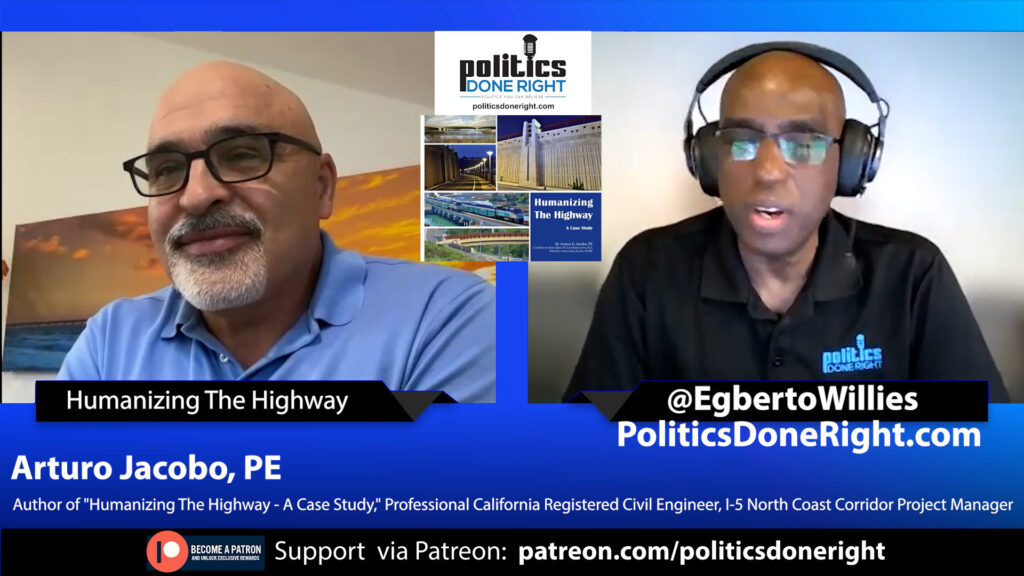Arturo Jacobo discusses humanizing the freeway in our “People Making A Difference” series. He has written the book “Humanizing The Highway – A Case Study,” which details how a highway project comes to fruition, taking into account the community at large.
Arturo Jacobo, PE, discusses his major CA Hwy project.
Podcasts (Video — Audio)
In a recent edition of “Politics and Right,” a platform dedicated to amplifying progressive voices and narratives, host Egberto Willies introduced a unique perspective on infrastructure development. The guest, Arturo Jacobo, a seasoned civil engineer with over three decades of experience, shared insights from his book “Humanizing The Highway.” This session was not merely an academic discussion but a familial exchange, as Jacobo is Willies’ brother-in-law, adding a personal dimension to the professional discourse.
Jacobo’s book is a profound narrative that transcends the technical aspects of highway design, offering a holistic view of infrastructure development. It serves as a guide for engineers, planners, environmentalists, and the general public, emphasizing the multi-disciplinary nature of such projects. Their conversation focused on a controversial project in San Diego County, which Jacobo led, and the transformative journey from a divisive highway project to a community-embraced endeavor.
The project’s initial conception as a mere highway expansion faced significant opposition due to its path through six affluent, politically active coastal cities and its impact on environmentally sensitive areas, particularly six lagoons that had been adversely affected by previous construction practices. Jacobo’s approach, reflective of a progressive mindset, was to view the project not as a problem but as an opportunity for comprehensive community development.
The multi-faceted strategy involved highway improvements, rail enhancements, community improvements, and significant environmental components. Jacobo emphasized the importance of not solely relying on highway expansion to solve congestion issues, advocating for a balanced approach that included public transportation and environmental considerations.
One of the project’s most innovative aspects was the Public Works Plan Resource Transportation Enhancement Program. This long-range plan was designed to balance various modes of transportation and community needs, with a particular emphasis on environmental mitigation. The plan proposed over 250 acres of new wetlands across the lagoons, restoration projects, and the treatment of water runoff from the freeway, ensuring cleaner water entering the lagoons and, ultimately, the ocean.
Jacobo’s approach demonstrated a deep understanding of the interconnectedness of environmental health, community needs, and transportation infrastructure. The project didn’t just aim to build a road; it sought to restore and enhance natural habitats, improve local water quality, and provide community amenities like bike lanes and trails. This comprehensive approach won the support of local officials, environmental agencies, and the community, transforming a controversial project into a championed one.
The conversation also emphasized the importance of incorporating local character into infrastructure design. In Oceanside, for example, the freeway design included elements reminiscent of architect Irving Gill, resonating with the community’s architectural heritage. Such attention to detail reflects a progressive approach to infrastructure, where functionality is married with aesthetic and cultural sensitivity.
The project’s success, as Jacobo highlighted, was largely due to the collaborative approach involving elected officials, resource agencies, and the community in the planning and execution phases. This inclusive, community-driven infrastructure development model is becoming increasingly vital in a world grappling with rapid urbanization and environmental challenges.
In closing, Jacobo mentioned that proceeds from his book are being donated to the California Transportation Fund for scholarships, benefiting children of workers who have lost their lives in service to the state. This gesture underscores a commitment to social responsibility and the betterment of the community, principles at the heart of progressive values.
Jacobo’s work, as showcased in “Humanizing The Highway,” is more than an engineering feat; it is a testament to the power of inclusive, environmentally conscious, and community-oriented infrastructure development. It stands as an example for future projects in California and globally as we strive to build more sustainable, equitable, and humane urban environments.
Viewers are encouraged to subscribe and join the conversation for more insightful commentary and to support progressive messages. Together, we can populate the internet with progressive messages that represent the true aspirations of most Americans.

